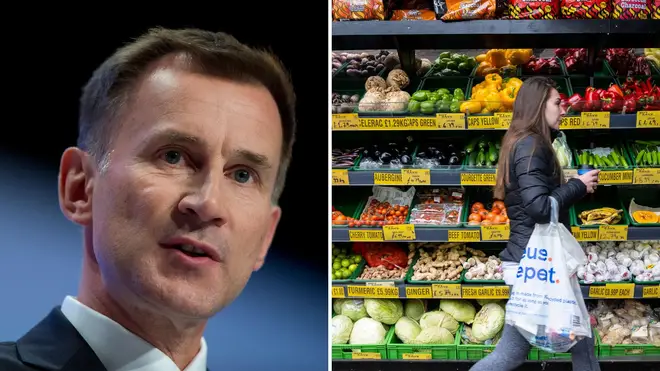
Matthew Wright 7am - 10am
20 April 2023, 00:25 | Updated: 20 April 2023, 00:51

Supermarkets say price hikes are set to ease despite food cost inflation continuing to rise.
The British Retail Consortium said: "As food production costs peaked in October 2022, we expect consumer food prices to start coming down over the next few months."
It added that there is usually a lag of three to nine months for prices on shelves to match inflation - and thus rises should decelerate going forward.
The latest call for calm comes after the Chancellor insisted the UK's economy "is on the right track”, despite inflation remaining in double digits yesterday.
Mr Hunt told Sky News: “There is no such thing as an automatic fall in the headline rate of inflation.
“That’s why we have a plan and if we’re going to reduce pressures on families it’s absolutely essential that we stick to that plan and we see it through so we halve inflation this year, as the prime minster has promised”.
"Although our core inflation is marginally higher than other countries, this is a common problem we’re all facing.”
He said while the core inflation is higher in the UK than other European countries, places like Germany have a higher rate of food inflation.
“Everyone is very clear that the UK is on the right track to focus on bringing down inflation," he added.
Read More: More interest rate hikes on cards as inflation proves hard to shake, say experts
“And if we do that we can get through this very difficult period and make sure that we’re not having the same discussions this time next year”.
Mr Hunt's comments come after new figures which show food prices accelerated at their fastest rate for 45 years last month, with inflation of food and non-alcoholic drinks soaring to 19.2%.
In February the figure stood at 18%.
Food prices overall have increased by 19.6% per year, driven by rising price of bread and cereal (19.4%), meat (17.4%), and fish (16.7%).
Some food items have soared staggeringly in cost - with whole milk up by 37.9% and eggs by 32%.
The price of olive oil has increased by nearly 50% - driven by the Ukraine war.
Veg is up by 19,3% and fruit 10.6%.
Annual inflation has slowed following a rise in Feb 2023:
— Office for National Statistics (ONS) (@ONS) April 19, 2023
▪️ Consumer Prices Index including owner occupiers’ housing costs (CPIH) rose by 8.9% in the 12 months to Mar 2023, down from 9.2% in Feb 2023
▪️ CPI rose by 10.1%, down from 10.4%
➡ https://t.co/xKfB2k07mc pic.twitter.com/Ab0eVpqiiN
The ONS said that food and non-alcoholic beverage inflation is the highest seen for over 45 years, with estimates suggesting that the rate would have last been higher in August 1977, when it was estimated to be 21.9%.
The overall inflation rate has dropped but stayed in double digit levels.
The consumer prices index dropped to 10.1% in March, down from 10.4% in February, according to the Office for National Statistics.
Hard-pressed consumers are seeing some relief after months of soaring prices. But economists had predicted a fall to 9.8%.
Overall, goods prices rose by 12.8% in the year to March, while services inflation stuck at 6.6%.